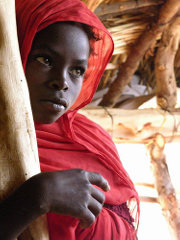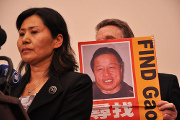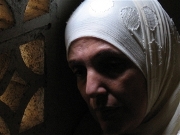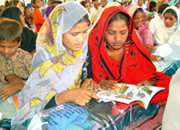Muslim mob murders him in his home in assault on village.
By Wayne King
ISTANBUL, August 10 (Compass Direct News) – A Coptic Christian was killed and several others were injured in Upper Egypt after Muslims on Sunday (Aug. 7) attacked a predominantly Christian village following an argument between a Muslim and Christian.
The attack at Nazlet Faragallah village in Minya, 218 kilometers (136 miles) south of Cairo, lasted until Monday morning (Aug. 8), Christians said. The attackers raided an unknown number of homes owned by Christian villagers and set eight on fire, area residents said.
The assailants killed Maher Nassif, 46, a civil servant and livestock farmer, when he tried to defend his home. The men burst into Nassif’s house, shot him in the head and slit his throat while his teenage son watched from under a bed where he was hiding, Christian villagers said. The men looted the home and stole Nassif’s livestock as his son escaped into the night, according to villagers who spoke with the boy.
One villager, Melad Thabet, a 25-year-old teacher, said he spent the night of the attack listening to gunfire and the sound of people “weeping and screaming in the village.”
“Any [Christian-owned] house close to a Muslim house was looted and attacked,” Thabet told Compass. “And if someone had stood up to them, they would have killed them as they did with Maher.”
Initial reports on what sparked the attack varied widely, but as the dust settled, the general consensus was that on Saturday (Aug. 6) a Muslim man driving a three-wheeled taxi known across Egypt as a touk-touk had an argument with a Coptic woman in Nazlet Faragallah. The nature of the argument could not be confirmed, but several Coptic men came to the aid of the woman, ending the dispute.
Several hours later, a group of Muslims arrived at the village church and started pelting congregants with rocks as they left the building, villagers said. The Copts responded in kind. Several people suffered cuts and bruises, and some of the windows of the church building were broken.
According to Thabet, the leader of the Muslims attacking the church was the cousin of the man involved in the initial argument involving the Coptic woman. He is also a police lieutenant stationed in the village. The lieutenant was hit in the face with a rock, Thabet said.
In response to the villagers’ claims, police have issued their own report about the incident, stating that it started on Sunday (Aug. 7) after a Coptic man began screaming insults and throwing rocks at Muslims exiting prayer at one of the two mosques near the village. Thabet said this version “doesn’t make any sense.”
One mosque is in a Muslim area, and any Copt going there “would be killed,” he said. The other mosque near the village, he added, is located at the far edge of the community and only one Muslim attends it – the man who opened it.
Regardless of what triggered the incident, by Sunday groups of Muslim men carrying long knives and automatic weapons were seen gathering around the village.
“They went around all the neighboring villages spreading a rumor that ‘the Christians burned the mosque and killed some Muslim people,’ which isn’t true,” Thabet said. “And we suddenly found that the village was surrounded by Muslims from everywhere.”
Late that night, after the Ramadan fast had ended for the day, the attacks began, Thabet and other sources said.
Waiting for the Army
Running through the community shooting rifles into the air and screaming, “Allahu Akbar [God is greater],” the Muslim villagers attacked houses and businesses isolated on the edge of the village, Thabet said.
They forced the victims out of their homes and then looted their property, he said, and not all homes were set on fire. Thabet named six different families whose homes were destroyed but said a total of eight homes were torched, and not all homes that were looted were set ablaze.
The house of the parish priest was razed. He hid on the upper floors of his home during the attack and somehow escaped the fire with only minor scrapes and bruises, according to Thabet.
Nazlet Faragallah is a Christian-majority village surrounded by a string of Muslim villages. The villagers are largely impoverished and make their living by farming and doing sporadic work at a nearby rock quarry.
During the attack, only 10 soldiers and one officer were posted to Nazlet Faragallah, an area with a combined population of about 10,000 people, according to 2006 United Nations population figures. Thabet said that in addition to a lack of manpower, the army isn’t equipped to stop violence in the community. Because of this, he said, local soldiers are simply unwilling to get involved in any disputes.
It took some four hours for soldiers to get back up from other army units in the area, he said.
“Every time we asked him [a police officer] to get involved to stop what was happening, he kept saying he was ‘waiting for the army,’” Thabet said. “Even when they [police] came, the number was very, very small. It didn’t help at all. They weren’t even able to protect themselves. They didn’t even have weapons; they had sticks. Having sticks is not the right thing to face machine guns.”
According to the Egyptian newspaper Watani, seven Muslims were arrested because of the incident. One Coptic man was arrested and charged with illegal possession of weapons. Some fear he was arrested to give officials a bargaining tool to force the Copts into a “reconciliation meeting” agreement with unfavorable terms.
Based on the concept of traditional tribal meetings, such reconciliation meetings are ostensibly meant for parties to come to amicable solutions outside of court. In reality however, the meetings are used to deny Copts their rights when they are attacked, human rights activists in Egypt say.
A reconciliation meeting took place on Tuesday (Aug. 9), said Zakaria, a Coptic villager who would only give his first name. He said Muslims and Christians involved apologized for the incident, and the council agreed to fine anyone else causing further trouble.
Nassif’s killer has not yet been arrested, in spite of being identified by his son. Zakaria said the atmosphere in the village was so tense on Monday morning, after the attacks, that Christians buried Nassif’s body outside of the village.
“They usually hold the funeral prayers in the village, but because of what happened they had to do it outside the village,” he said.
Lawlessness
Thabet said relations between Christians and Muslims in Egypt have gotten much worse since the Jan 25-Feb. 11 revolution. He blamed worsened relations on the increased radicalization of certain Muslims in Egypt who want to “complete their faith by killing Christians.”
An incident like the one in Nazlet Faragallah can happen “for any silly reason,” he said.
“What does it do if you just keep chanting ‘Islam! Islam!’ when there is a stupid problem between two ordinary people in the village?” he asked rhetorically. “There is no relation between two people just having an ordinary argument and having religion getting involved in it. Sometimes religion controls people. They don’t think, they just do.”
Thabet said he has fled his home in anticipation of other attacks. Keeping in touch with his neighbors by phone, he said that at night there are still skirmishes on the edges of the village.
“Any house near the fields and away from anything can get looted and attacked by the thugs and these people,” he said. “A lot of the villagers have left to escape with their lives. All our young men have locked themselves in their houses and try to hide, just waiting for whatever is going to happen to them – either waiting for their house to be burned or for somebody to get in and attack them.”
Zakaria confirmed that many residents have fled the village.
“In the beginning, the people who were leaving were the women and children,” he said, adding that now “the people who live in the houses at the edge of the village” are leaving too.
Zakaria was unable to leave, he said, because it was still too dangerous to pass through the villages surrounding Nazlet Faragallah on foot.
Thabet said he doesn’t think the village will be safe again.
“When I was in the village, I saw my family and friends getting shot at, and I couldn’t do anything for them,” he said. ‘I didn’t know who to contact, who to call to protect us. I hope God protects us.”
END
**********
Copyright 2011 Compass Direct News










